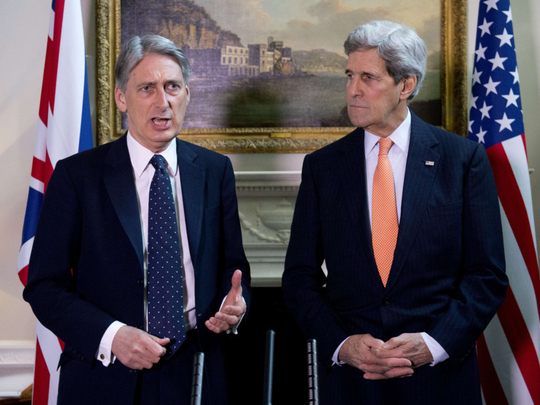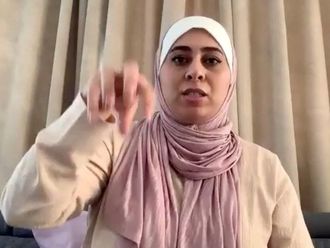
Geneva: US Secretary of State John Kerry was due to arrive in Geneva on Sunday for renewed talks with his Iranian counterpart on Tehran’s nuclear programme, after warning that “significant gaps” remain as a key deadline approaches.
World powers are trying to strike a deal with Iran that would prevent Tehran from developing a nuclear bomb in return for an easing of punishing international economic sanctions.
Kerry is set to sit down for two days of talks with Iranian Foreign Minister Mohammad Javad Zarif, whose country denies its nuclear programme has military objectives.
The US top diplomat on Saturday warned that major differences remained between the two sides.
“There are still significant gaps, there is still a distance to travel,” Kerry told a press conference at the US embassy in London.
There is a heightened sense of urgency to move forward as the clock ticks down towards a March 31 deadline to agree on a political framework for the deal.
“President [Barack] Obama has no inclination whatsoever to extend these talks beyond the period that has been set out,” Kerry said.
US and Iranian diplomats have been meeting in Geneva since Friday, and senior negotiators from the so-called P5+1 group of Britain, China, France, Russia, the United States and Germany were also expected to meet on Sunday to help drive the talks forward.
Kerry stressed on Saturday that there was “absolutely no divergence whatsoever in what we believe is necessary for Iran to prove that its nuclear programme is going to be peaceful.”
“The P5+1 remains united on the subject of Iran,” he said.
As a sign that efforts were stepping up a notch, US Energy Secretary Ernest Moniz flew in to snow-covered Geneva on Saturday to take part in the talks for the first time.
Ali Akbar Salehi, the Director of the Iranian Atomic Energy Organisation, was also participating in the negotiations.
The two officials and their delegations spent five hours at the negotiating table on Saturday, Iranian media reported.
PROMISING SIGN
Observers said Moniz and Salehi’s participation was a promising sign that a deal could be within reach.
Kelsey Davenport, head of the Non-proliferation Policy Arms Control Association in Washington, pointed out in an email to AFP that Moniz with his technical expertise would “be a key validator when a deal is concluded.”
And Salehi, who plays a similar role, would “likely be instrumental in selling the agreement in Tehran,” he added.
But Kerry played down any suggestion that their participation meant the talks were on the verge of a breakthrough.
“I would not read into it any indication whatsoever,” he said, adding that Moniz was present because of the “technical” nature of the talks.
Salehi arrived early on Saturday with Zarif and Hussain Fereydoun, the brother and special aide to Iranian President Hassan Rouhani, to help coordinate the talks, Iranian media reported.
While the political aspects of the deal must be nailed down by the end of next month, the deadline for signing the full agreement is June 30 — a cut-off point that looms all the larger after two previous deadlines have been missed.
“Another extension is extremely unlikely,” Davenport said, pointing out that both Obama and Rouhani were “facing pressure from hardliners that oppose a deal and seek to derail the talks.”
Moniz participated in talks with Iranian officials on Saturday. It was the first time that Moniz, who is himself a nuclear physicist, had joined the negotiations, although US energy officials have been involved in the intensive technical talks under way ahead of meetings scheduled between the countries’ top diplomats on Sunday and Monday.
The technical aspects of the deal include the detailed arrangements for Iran’s future enrichment of uranium.
The process produces fuel for nuclear reactors but in highly extended form can also produce the core of an atomic bomb, the source of international concerns about Iran’s ambitions.












